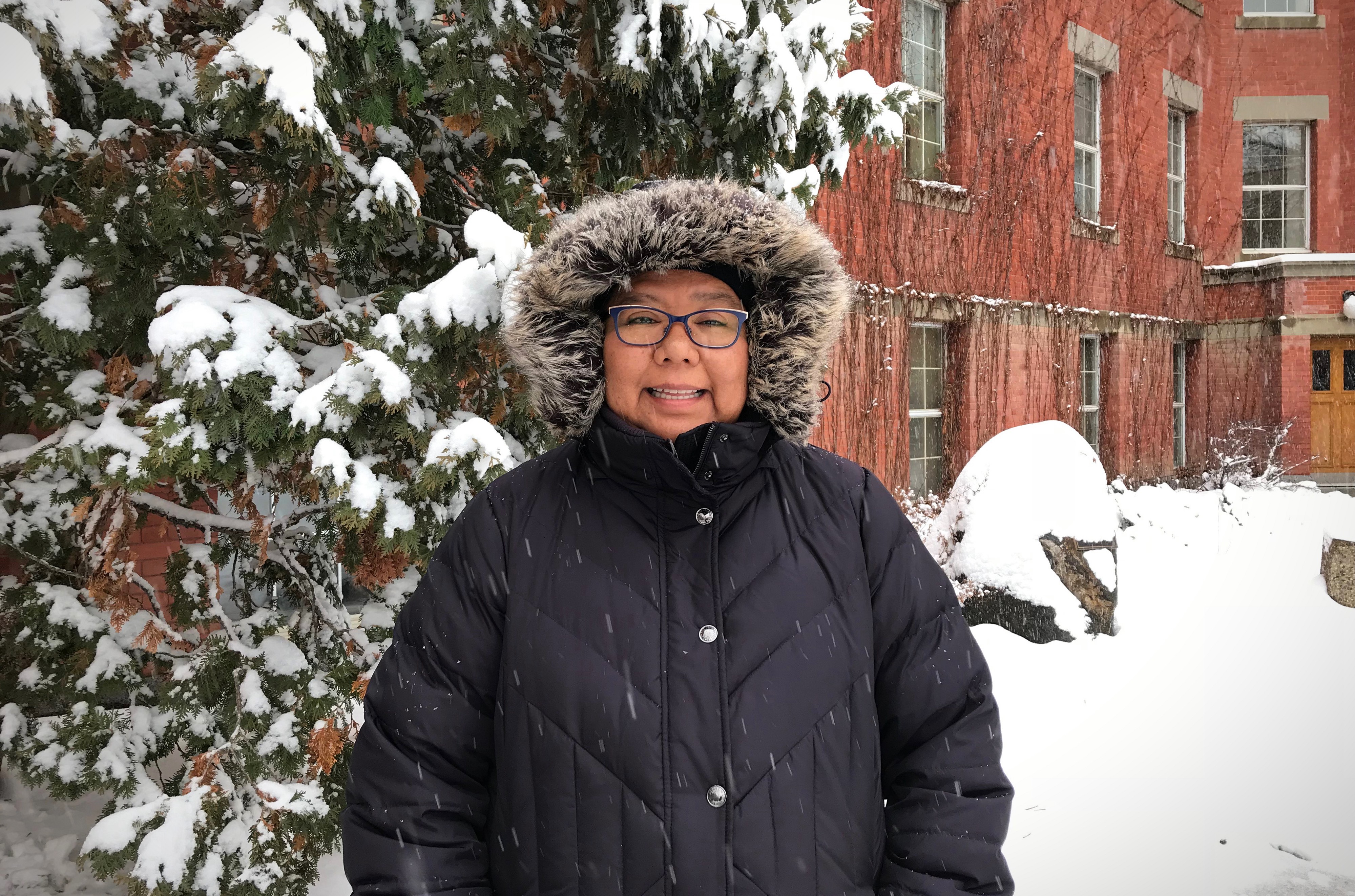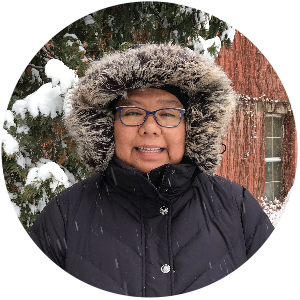
Have you met Melvatha, Assistant Professor of Indigenous Language Sustainability in the Department of Linguistics, who recently relocated to Edmonton from New Mexico? Spend the next few minutes getting to know her a little better.
Where is your favourite place on campus?
My office — I like the view of the Quad and I really like seeing the green, the fall colors, the snow and Christmas lights.
Tablet or paper?
Paper. I think what attracts me to it is that it’s something tangible. And when you’re writing you’re not restricted to typing in a linear fashion. I like to be able to doodle and to flip back to see what I’ve written.
Name one thing you’ve brought to work from home.
I brought my corn pollen pouch — it’s a medicine pouch made from deer hide and I carry my corn pollen in it. In my tradition, the Navajo tradition, corn pollen is used to pray and to bless your path. You might have heard the phrase, “Walk in beauty”, that’s about you creating your path.
You can only collect the pollen in the early morning. You can set your path for the day, and it’s yellow like the sunshine and sunset. We use it in a lot of our ceremonial practices; it’s used for prayer from the afternoon on, and white cornmeal is used in the morning.
What’s the one thing you can’t live without?
I don’t think I could live without my culture and my language because it has always been a strong foundation for me. I identify with my traditions and ceremonies and I speak my language. I have always participated in the Hozhǫ́ǫ́jí (Blessingway), and in the Kinaaldá ceremonies. The Kinaaldá ceremony is performed when a girl becomes a woman and is for her and about her. The idea is that during the ceremony she becomes Changing Woman and during this time she is holy. It is a four day ceremony where the girl runs every morning, afternoon, and again before the sun goes down. She is kept busy throughout the day by performing various tasks such as corn grinding, and she receives different teachings throughout the ceremony. On the fourth day we make a corn cake wrapped in corn husk that she helps to prepare by preparing the corn batter and the corn husk, then she rests, and later, participates in the overnight ceremony.
I have a lot of nieces, and I plan on participating in their ceremonies by singing and teaching them things such as how to behave and dress for ceremony, as well as pass down the normal customs to the younger ones, to show them how to be as a Navajo woman. This is who you are; these blessings are for you, for your future knowledge, strength, and passion, for anything that comes your way, so that you are be able to maneuver and overcome challenges.
If you won airfare anywhere in the world, where would you go?
I love to travel. I’ve travelled all over the world…where would I go? Outer space would be nice. I’d like to view Earth from beyond the atmosphere and see it with my own eyes.
You can invite anyone — alive or dead, real or fictional — to dinner. Who would it be?
So, my Grandmother says to me, “You work a lot, you love to cook, and you help your family. You remind me of this story…” She maintains that her great-grandmother’s mother, who during the Navajo Long Walk was one of two sisters — one was sick, and the other was healthy — she was the one who was sick. The story that has been passed down to me is that the healthy sister took the sick one with her and nursed her to health on their way to Bosque Redondo. The sister who was initially very sick made it back, but the sister who had been healthy dies there.
I would like to talk to the one who made it back. Apparently she was generous, compassionate, and helpful. I am one of her descendants.
If you could switch jobs with someone else on campus for a week, what would you do?
I would like to switch jobs with someone to bring awareness to, and to recruit Indigenous students into the Linguistics Department. I don’t know if they know that this is available as a field of study, and that they can work with their community members on linguistics projects. I believe they need to be leaders in their own communities on such projects.
What does “uplifting the whole people” mean to you?
That sounds to me like all human beings have access to receiving an education here.
If you could solve any problem in the world, what would it be?
It would be to effectively generate fluent speakers of Indigenous languages. The entire world is against these languages in so many ways that it’s hard to generate speakers.
What 3 words best describe your U of A experience?
Oh Boy! Well, it’s enjoyable. A lot of people have been very nice. It’s challenging too. Being in a new school, new country, it’s all new experiences for me. Oh, and work, work, work!

Melvatha belongs to the Tsénahabiłnii clan and is born for the Kin Łichíi’nii clan. Her maternal grandfathers are the Hooghan Łání clan and her paternal grandfathers are the Áshįįhí clan. Melvatha is a United States Marine Corps Veteran and Diné women originally from Lake Valley, New Mexico. She maintains a deep connection to her culture and enriches her Navajo language, skills and knowledge for strength, and for her personal well-being.
Melvatha’s primary research looks at child acquisition of Navajo verb construction. She hopes her work will provide useful insights, improved teaching strategies, and a re-examination of pedagogical approaches in the acquisition of Athabaskan and polysynthetic languages.
Melvatha has worked as a Navajo language consultant, a tutor and instructor at both the high school and college levels, and as a Navajo language transcriptionist, translator, and interpreter for entities such as the State of New Mexico, the Navajo Nation Human Rights Commission, and the U.S. Department of Justice.